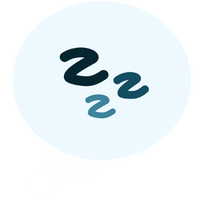Have you ever woken up feeling tired, unable to recall your dreams, and finding it hard to focus during the day? Chances are, you’re not getting enough REM sleep.
REM sleep is one of the 5 stages of sleep, often associated with dreams. Also, it plays a vital role in several essential functions, such as emotional regulation and brain development.
In this guide, we will explore the secrets of REM sleep, from its importance to the recommended REM sleep stage duration.

In addition, we will explore the consequences of REM Sleep Deprivation and provide you with tips to improve your REM Sleep and well-being.
So, join us below!
What Is REM Sleep?
Before we dive into the recommended amount of REM sleep, let’s first understand the specifics of sleep cycles.
As we sleep at night, our bodies drift through two main sleep phases: non-REM sleep and REM sleep. The non-REM sleep is divided further into three stages: NRER 1, NREM 2, and NREM 3. Each phase and stage of sleep lasts anywhere from 90 to 110 minutes.
What of REM sleep?
First discovered in the 1950s, REM sleep is the last phase of your sleep cycle. This phase is characterized by increased breathing, brain activity, blood pressure, and heart rate, like in a waking state.
But perhaps the defining feature of REM sleep is the rapid eye movements of the eyes behind closed eyelids, hence the name. Besides eye movements, you temporarily lose control of your arms and legs.
Scientists say this is your body’s way of protecting you from physically acting out your nocturnal visions and injuring yourself.
REM sleep usually occurs 90 minutes after you doze off and increases with each sleep cycle during night. The first REM Sleep cycle is shorter, but the last cycle can last as long as one hour.
How Many Hours of REM Sleep Do You Need?
As mentioned above, you enter the first REM sleep cycle approximately 90 minutes after sleeping. On average, you might go through this cycle 3 to 5 times throughout the night. What’s even interesting, the duration of REM sleep increases with every cycle, with the longest being the last.
However, REM sleep duration varies with age. Infants sleep for at least 8 to 9 hours during the day and about 8 hours at night, totaling 17 to 18 hours of sleep. Half of this time (50%) they spend in the REM sleep state.
As the babies approach early childhood and start sleeping for a few hours, they spend less time in the REM stage; about 25% of the time.
As adults, we need fewer hours of sleep, approximately 7 to 8 hours. As a result, the REM duration gradually reduced to roughly 20% of sleep time. That means adults spend about 1.4 to 1.6 hours in the REM sleep state.
Besides age, there are several factors and individual variations that can influence the amount of REM Sleep, including:
Sleep Deprivation
When your body is deprived of sleep, it might experience a REM rebound. This is where the body tries to compensate for the lost hours by increasing the length, intensity, and frequency of REM sleep.
The deprivation also reduces REM latency. This is the time it takes to enter the REM Sleep. Instead of entering the stage 90 to 120 minutes after sleep, you might experience the first REM episode much earlier in the sleep cycle.
Sleep Disorders
Sleep disorders like insomnia, sleep apnea, and narcolepsy could significantly affect the Rapid Eye Movement sleep phase. For instance, people with insomnia spend less time sleeping, which translates to reduce REM sleep duration.
As for sleep apnea, the pauses in breathing can disrupt the phases, shortening REM sleep.
Narcolepsy, on the other hand, affects the brain’s ability to control sleep-wake cycles. People with this sleep condition find it difficult to sleep and often enter the REM phase more quickly than normal.
There’s also RBD (REM Sleep Behavior Disorder). It’s a condition where the brain fails to paralyze your arms and legs during REM state. As a result, individuals might act out their dreams and hurt themselves.
Boxing, kicking, and punching also disrupt REM sleep and reduces the overall night’s sleep quality.
Medications
Some medications, including antidepressants, stimulants, and selective serotonins, suppress REM. Others, like monoamine oxidase inhibitors, can abolish REM sleep entirely. The same applies to substances like nicotine and alcohol.
Why Is REM Sleep Important?
REM Sleep stage is crucial for our health and well-being. It’s an integral part of the most essential functions in our bodies, including:
Brain Function
Scientists believe REM Sleep boosts brain development. This holds considering animals with less developed brains, like human babies and puppies, spend most of their sleep time in the REM stage. Creatures with well-developed brains, like birds and horses, spend less time in REM sleep.
REM sleep is considered the learning phase. It’s where the acquisition and integration of information learned throughout the day occurs. That’s why a sleep-deprived person displays reduced focus during the day, which affects his (or her) ability to learn efficiently.
The sleep stage is also associated with improved problem-solving skills and creativity.
Memory Function
In addition to learning, REM sleep plays a vital role in memory consolidation. When you enter the REM sleep state, your brain processes and consolidates newly learned information and skills. After that, it commits some to your memory, retains others, and deletes those with little significance.
Dream Function
While the various roles of sleep stages remain unknown, scientists speculate REM Sleep is responsible for our dreams. People woken from REM sleep can recall and elaborate vivid and emotional dream experiences.
Sure, dreams occur in non-REM sleep, but these visions are less vivid, emotional-laden, and more conceptual.
During REM sleep, the thalamus becomes active and sends images, sounds, and other sensations experienced during the day to the cortex. In combination with memories, emotions, and imaginative elements, our brain creates complex and immersive experiences that fill our dream worlds.
Emotion Regulation
Research published in 2020 shows that REM Sleep increases reactivity to emotional stimuli, an effect that promotes emotional processing.
In simple terms, this sleep stage helps to consolidate our emotional experiences and removes emotional stimulation from the previous day. Consequently, it allows us to better understand and cope with our emotions.
That said, disruption of REM sleep can prove detrimental to your emotional health. For example, it can lead to mood disturbance, emotional dysregulation, and increased risk of depression and anxiety.
Physical Restoration or Recovery
Aside from brain activity, REM sleep promotes physical recovery. During REM sleep, your body re-located resources to the task of repairing and restoring tissues and cells.
This is important, especially for athletes or people who engage in physical activities. That’s because REM sleep repairs damaged muscle tissues and enable muscle adaptation.
Furthermore, REM sleep facilitates the release of growth hormones, essential for tissue and cell repair, bone density, and muscle growth. The sleep stage also restores the central nervous system, including the brain.
Wakefulness Preparation
REM sleep helps us wake up feeling refreshed, alert, and mentally sharp by activating and restoring the central nervous system. The more time you spend in the REM sleep stage, the higher your chances of waking feeling restful and healthy.
Consequences of REM Sleep Deprivation
Several studies (on animals and humans) show that not getting enough REM sleep negatively affects memory function.
Insufficient REM sleep impairs your brain’s ability to convert experiences into long-term memories. It also impacts its potential to gain and process new information.
Other side effects of missing out on REM sleep include:
- Reduced problem-solving skills
- Emotional instability
- Irritability
- Increased susceptibility to stress and mood disorder
- Memory recall issues
Reduced REM sleep could also have long-term health implications. For instance, REM sleep deprivation could increase the risk of developing several health conditions, including:
- Obesity
- Depressions
- Type 2 Diabetes
- Cardiovascular diseases
- Cancer
How To Enhance Your REM Sleep
While it’s impossible to force yourself to enter the REM sleep phase, there are several strategies you can adopt to increase the percentage of REM sleep. Below, we’ve highlighted a few.
- Maintain a consistent sleep schedule: If you sleep for 7 to 8 hours, but still wake up tired, you need to adjust your sleep schedule. Ensure you go to sleep and wake up at the same hour every day. A consistent sleep schedule will allow you to regulate your sleep-wake cycles, including REM.
- Establish a comfortable sleeping environment: A good sleep environment helps you enjoy the benefits of a good night’s sleep. There are various ways to create a sleep-friendly space, such as sleeping in the dark, reducing noise, keeping the bedroom temperature cool, and avoiding screen time.
- Avoid alcohol intake: While most individuals associate alcohol with winding down, it’s not healthy for your sleep health. Although the effects of alcoholic drinks might feel relaxing, they interfere with your sleep patterns and reduce REM sleep duration.
- Limit stimulants during the day: Nicotine, caffeine, and other stimulants, especially at night, could interfere with your sleep. These stimulants keep your brain active, reducing the time it takes to fall asleep. They also shorten the sleeping duration and increase awakenings during the night.
Also Read:
Closing Thoughts
The next time you’re drifting into your dream world, remember you’re not just catching some “shut-eye”. Instead, you are regulating your emotions, consolidating your memories, and restoring your physical health.
Basically, investing in your REM Sleep translates to better physical, emotional, and cognitive health.
That is all for today. Happy Dreams!
